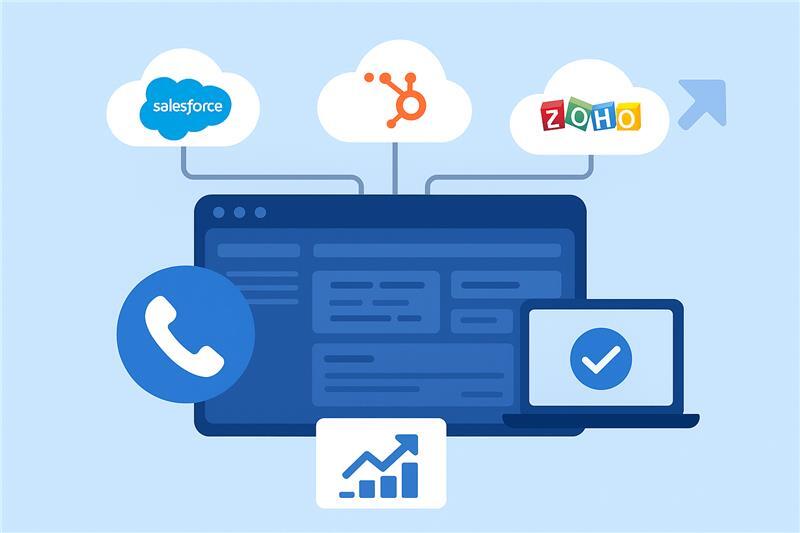
Call Audits for Call Centers: Process, Importance, & Best Practices
Managing a call center is no small feat, especially when customer expectations are sky-high. Keeping those calls smooth, professional, and helpful requires constant improvement. That’s where call audits step in to save the day. Whether you're new to the concept of call auditing or just looking to improve your call audit process, this guide will walk you through the essentials of conducting effective customer service audits in 2025.
What is Call Audit in Call Centers?
Call audit meaning refers to a systematic review of customer interactions to assess their quality, compliance, and effectiveness. Think of it as a check-up for your customer service Audit, ensuring that agents follow scripts, adhere to compliance guidelines, and deliver a top-notch experience through comprehensive call center auditing.
Call audits cover:
- Whether agents resolve issues effectively during audit calls.
- Adherence to call audit parameters or compliance protocols.
- How well agents use soft skills like empathy and active listening.
- Identifying areas where agents can improve or where processes can be streamlined.
It’s not about catching mistakes—it's about uncovering opportunities to make your customer contact audit interactions better through systematic auditing customer service practices.
Importance of Conducting Regular Call Audits
Regular call audits aren’t just a "nice-to-have"; they’re essential for a well-run call center audit program . Here’s why implementing a robust call center audit program matters:
1. Improves Customer Satisfaction
Customers notice when agents are confident, clear, and empathetic. Call audits ensure these elements are present in every interaction. directly impacting your customer experience audit checklist.
2. Tracks Agent Performance
Call quality monitoring checklist gives managers a clear understanding of where agents shine and where they need support, leading to targeted training and better results through comprehensive customer service audit process.
3. Ensures Compliance
For industries like finance or healthcare, staying compliant isn’t optional. center compliance auditing and call center compliance auditing protect your organization from fines and liabilities.
4. Identifies Process Gaps
Sometimes, repeated customer complaints signal a larger issue in your workflow. Call audits help identify these patterns so you can act.
5. Boosts Revenue
Happy customers mean more loyalty, referrals, and upsell opportunities. Better calls directly impact your bottom line.
Call Center Call Audit Checklist
When conducting a call audit, it’s essential to have a clear structure. Here’s a handy checklist to guide you: Here's a comprehensive audit checklist for customer service to guide you:
1. Pre-Audit Preparation
- Define your goals: Are you looking to improve customer satisfaction, compliance, or agent performance?
- Choose the sample size: Will you review 10%, 20%, or 100% of calls using your call center audit tool?
- Prepare your call bell audit template or call audit template for consistent evaluation
2. Key Metrics to Evaluate
- Compliance: Did the agent follow protocols and meet regulatory requirements?
- Resolution Quality: Was the issue resolved on the first call?
- Soft Skills: Did the agent demonstrate empathy, patience, and clarity?
- Adherence to Script: Did the agent follow the approved guidelines without sounding robotic meeting your call center quality control checklist standards?
3. Red Flags to Look For
- Miscommunication or incorrect information given to the customer.
- Failure to escalate when necessary according to customer service audit procedures.
- Overlooking compliance steps.
4. Post-Audit Review
- Share feedback with agents in a constructive, positive manner.
- Document recurring issues and create actionable plans to address them.
Key Metrics to Evaluate in Call Audits
When conducting a call audit in a contact center or BPO setup, evaluating the right metrics ensures you’re assessing performance holistically. Here’s a breakdown of common call center metrics to include in your call quality audit sheet format:
1. Average Handling Time (AHT)
This measures the average duration of a customer interaction, including hold and follow-up time. A shorter AHT often signals efficiency, but it’s crucial to balance this with quality to avoid rushing customers in your call process audit checklist for automation.
2. First Call Resolution (FCR)
The percentage of calls resolved during the initial interaction. A high FCR indicates that agents are equipped to address customer needs effectively without requiring callbacks.
3. Customer Satisfaction Score (CSAT)
Based on direct customer feedback, CSAT reflects how satisfied customers are with their interaction. Use post-call surveys to gather this data.
4. Net Promoter Score (NPS)
NPS measures customer loyalty and their likelihood of recommending your services. While not specific to individual calls, it’s influenced by the overall call experience.
5. Call Adherence
Tracks whether agents stick to schedules and handle calls as per the expected workflow. This is crucial for maintaining operational efficiency in high-volume environments.
6. Compliance and Script Adherence
Particularly for BPOs handling regulated industries like finance or healthcare, ensuring agents follow mandatory guidelines and approved scripts is non-negotiable.
7. Quality of Resolution
Evaluates how well the issue was resolved, looking at whether the solution provided addressed the root problem or just the symptom.
8. Agent Soft Skills
Key interpersonal skills like empathy, tone, clarity, and active listening contribute significantly to a positive customer experience.
9. Escalation Rate
Tracks how often calls are escalated to supervisors. High escalation rates can indicate gaps in agent training or unclear processes.
By regularly auditing these metrics, you can gain a 360-degree view of your contact center's performance and pinpoint areas for improvement.
How to do an effective call audit in your contact center BPO
Want to make your call audits impactful? Here are five actionable tips:
1. Involve Your Team in the Process
- What to Do: Share the purpose and benefits of call audits with your team. Explain that audits are tools for growth, not a means to penalize.
- Why It Matters: Transparency fosters trust and reduces resistance to feedback. When agents understand that what is call auditing are about improving customer satisfaction and their own performance, they’re more likely to engage positively.
- Pro Tip: Create an open forum where agents can provide input on the call audit template criteria or process. This can make them feel more invested.
2. Leverage Effective Call Auditing Tools
- What to Do: Automate the entire call audit process with tools like Salesken, which provide AI-driven insights into agent adherence, customer sentiment, and areas for improvement.
- Why It Matters: Manual audits are time-consuming and prone to bias. Automated tools allow you to evaluate 100% of calls, track trends, and provide actionable insights at scale.
- Pro Tip: Look for tools that offer real-time coaching features to assist agents during live calls, helping them course-correct instantly.
3. Develop a Balanced Scoring System
- What to Do: Use a mix of qualitative and quantitative metrics, such as AHT, CSAT, and compliance, to score calls. Assign weights to different metrics based on their importance to your business goals.
- Why It Matters: A balanced scoring system ensures no single metric skews results, offering a fair and comprehensive evaluation.
- Pro Tip: Regularly review and adjust scoring criteria to align with evolving customer expectations or business priorities.
4. Focus on Coaching, Not Criticism
- What to Do: Use audit results to create personalized coaching plans. Offer actionable suggestions instead of vague feedback. For example, instead of saying “Be more empathetic,” provide a script or examples of empathetic phrases to use.
- Why It Matters: Constructive feedback helps agents see audits as opportunities for growth, not judgment. This leads to higher morale and better adoption of improvement suggestions.
- Pro Tip: Pair agents with a mentor or peer for shadowing sessions where they can learn best practices in action.
5. Review and Refine Regularly
- What to Do: Treat audits as a continuous improvement tool. Schedule regular review sessions to identify trends, common challenges, and recurring issues.
- Why It Matters: Customer expectations and business needs evolve, and so should your audit process. Regular reviews ensure your audits stay relevant and effective.
- Pro Tip: Share insights from call audits with other teams, such as training, product development, or operations, to create a unified approach to improvement.
By following these best practices, your contact center can elevate its quality assurance process, reduce customer churn, and boost agent performance, all while saving time with the help of advanced call auditing tools.
How to Automate Call Audits and Save Time
Manual call audits, while effective, can be time-intensive, especially in high-volume contact centers or BPOs. Automating the process not only saves time but also ensures accuracy and consistency across evaluations. Here’s how automation can transform your call auditing process:
1. Leverage AI-Powered Call Auditing Tools for Real-time Call Auditing
AI call auditing tools,, like Salesken, analyze call recordings and transcripts to identify patterns, compliance adherence, and performance gaps without the need for manual intervention . These call center audit tools can:
- Evaluate 100% of calls instead of a random sample using automated call auditing.
- Spot common customer complaints, agent errors, or areas for improvement.
- Provide real-time call auditing feedback to agents during live calls, helping them adjust instantly.
2. Set Up Customizable Metrics
With automation, you can define specific metrics like Average Handling Time (AHT), First Call Resolution (FCR), or soft skills adherence, and let the system track them consistently. Automated call auditing systems generate detailed call center audit reports, giving you actionable insights at a glance.
3. Streamline Compliance Checks
For contact centers in regulated industries, compliance is critical. Automated auditing tools can flag instances where agents miss key phrases or fail to follow compliance scripts, reducing the risk of fines and regulatory issues.
4. Provide Data-Driven Insights for Coaching
Instead of spending hours sifting through calls, automated call auditing delivers instant data on agent performance. Managers can quickly identify areas where agents need support, enabling more focused and personalized coaching sessions.
5. Reduce QA Costs and Time
By automating repetitive auditing tasks, contact centers can significantly reduce the time spent on quality assurance. This frees up QA teams to focus on strategy and high-priority cases.
Why Automating Call Audits is Essential in 2025
As customer expectations evolve, manual processes may fall short of delivering the speed and precision required. Automated call auditing ensures that your call audits are not only faster but also more comprehensive, enabling your contact center to improve customer satisfaction, streamline agent performance, and scale quality assurance efforts efficiently.
AI call auditing tools like Salesken make it easier to embrace automation by providing AI-powered insights, real-time coaching, and automated compliance tracking—all while cutting down QA costs by up to 80%. It’s a win-win for both agents and managers.
By automating call audits, your contact center can stay ahead in 2025, delivering seamless customer experiences while saving time and resources.
Call audits are more than just evaluations; they’re a way to ensure your team delivers exceptional customer experiences every day. With a clear checklist, regular feedback, and the right tools like Salesken, you can streamline your audits, empower your agents, and see real improvements in your call center’s performance.
What are you waiting for? It’s time to transform those calls into seamless customer experiences.Book a demo with Salesken today!
FAQs
1. How often should I conduct call audits in my contact center?
For automated call auditing, monitor 100% of calls continuously. For manual call quality audits, audit 10-20% of calls monthly, with weekly reviews for new agents. Real-time call auditing tools enable constant monitoring without resource strain. Consistency matters more than frequency—regular call audits using a standardized call audit template deliver better results than sporadic reviews.
2. What's the difference between call auditing and call quality monitoring?
Call auditing is a formal review process using a call audit checklist to evaluate specific interactions and generate call center audit reports. Call quality monitoring is ongoing observation that includes live coaching and immediate feedback. Call audits are structured evaluations, while quality monitoring encompasses the entire customer service audit process including real-time guidance.
3. How can automated call auditing improve my call center compliance auditing?
Automated call auditing ensures 100% compliance coverage and eliminates human oversight errors. AI call auditing tools instantly flag violations, missing disclosures, or protocol deviations, creating comprehensive call center audit reports for regulatory purposes. Real-time call auditing alerts enable immediate intervention when compliance issues arise, significantly reducing regulatory risks.
4. What should I include in a call audit template for effective customer service audits?
Your call audit template should include opening/closing procedures, compliance requirements, resolution quality, and soft skills assessment. Essential call audit parameters include greeting standards, active listening, problem-solving approach, and adherence to protocols. Include rating scales, specific feedback sections, and action items. Customize your audit checklist for customer service based on industry-specific compliance needs.
5. How do I choose the right call center audit tool for my organization?
Select call center audit tools based on call volume, budget, and specific needs. Prioritize ai call auditing tools with automated call auditing capabilities, real-time call auditing features, and comprehensive reporting. Key factors include system integration, customizable call audit parameters, scalability, and support for both manual and automated call auditing. Start with trials to ensure the tool aligns with your call center audit checklist requirements.

.png)

